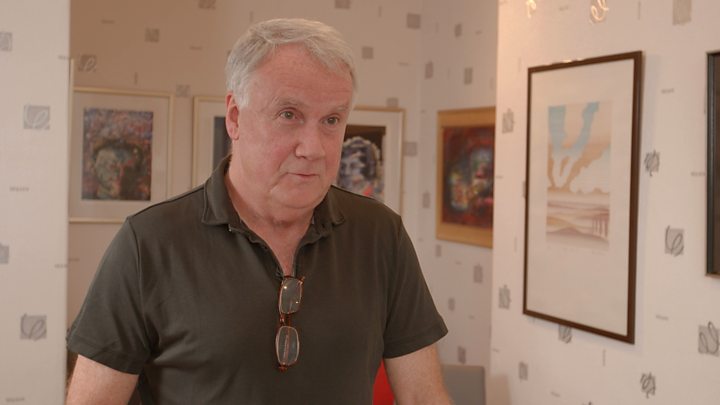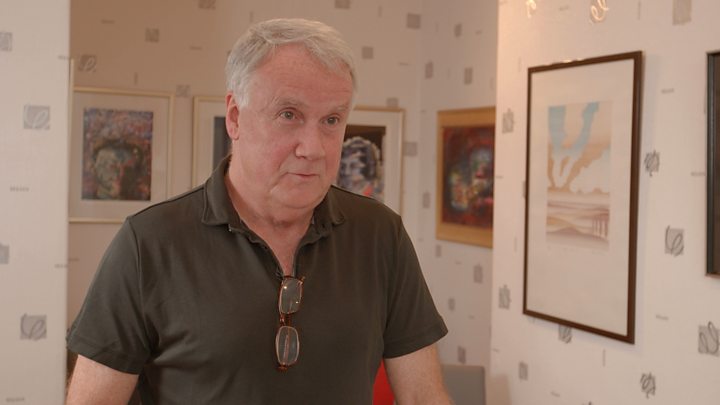

When Colin McIntyre was told by the NHS he would have to wait nine months for a new hip he decided to look at other options.
The 65-year-old went to France for his operation and to his surprise he got the money back from the NHS.
Colin, from Glasgow, says his problems started about three years ago.
He was a regular at the gym, went dancing and played squash five times a week but his right hip was starting to give him “some gip”.
Colin (right) is back to playing squash after his hip operation
It was diagnosed as osteoarthritis.
He was told it would gradually get worse in the coming months but surgery was said to be “the last option” for him.
Over the next few months it got much worse.
He had to give up all his sports and began to struggle to walk because of the pain.
Colin looks at the x-rays of his hip
Colin says: “I can remember sitting at my desk one day with one of my clients and he was looking at me and he said ‘you know, you just look so unhappy and you’re just obviously in pain’.
“And that became the norm, and it affects everything. It affects relationships, it affects the home, the way you look at things in general.”
NHS waiting list
Unhappy with his NHS diagnosis, Colin went to see a private consultant who told him he had “absolutely no cartilage” in his right hip.
The consultant referred Colin back to the NHS waiting list for a hip replacement operation and he quickly received a letter guaranteeing treatment within 12 weeks.
The letter said he would be offered an appointment before 16 February 2017.
However, about halfway through his 12-week wait he got a phone call from the hospital that advised him it was going to take eight or nine months.
Colin received a letter saying his treatment was guaranteed within 12 weeks
“I said to the lady ‘why have you sent out this letter?’,” Colin says.
“She said ‘well it’s a legal requirement, we have to send the letter’.
“So I then said so you’re going to send me another letter explaining all this? And she said no we don’t send out other letters, we just make phone calls.”
Looking for an alternative
Colin says he was shocked that the 12-week treatment “guarantee” detailed in the Patients’ Rights Scotland Act was “not worth the paper it is written on”.
He decided he could not spend nine months in pain and looked for an alternative.
He checked out the cost of having the operation done privately by the consultant he had seen earlier.
It was going to be between £10,000 and £12,000.
Colin looked for alternatives to waiting nine months on the NHS list
There is nothing to stop patients going anywhere in the world for an operation if they are prepared to pay.
But the cost is a major issue as well as concerns over the quality of the operation.
Colin says: “At the time I was speaking to different people and they were saying ‘you look terrible’ and then one of my clients said to me, ‘I know someone who is going to France to have his hip done’.”
Colin got the phone number of the man having his operation in France and kept in touch.
“He was extremely impressed with it and for me that was better than any kind of written testimonial on the internet, or whatever,” he says.
Colin was told he would have to wait up to nine months for his operation
Colin contacted the surgery in France and got more information.
“I was told that if you have your EHIC (European Health Insurance Card) it was going to cost £3,450,” he says.
“If I didn’t have that card, it would have been about £10,000.”
“At that point I thought ‘Well, I’m fortunate I could afford that’.
“I was going to have to pay for flights and maybe a little bit for hotel accommodation but it wasn’t going to be £10,000 or £12,000.”
Within two weeks, he was in France having the operation.
He says: “I had the operation on the Wednesday morning, and the pain just went completely which was for me the best thing and then within two days I was on crutches, being shown how to walk up and down stairs.
“I was driving again within about two and a half weeks. It was just unbelievable.
“I gave myself six months to fully recover before I played any kind of racketball but I was going back to the gym because I’d always been doing that kind of stuff.”
Filled in a form
Colin says he thinks about his decision in terms of paying to get back seven or eight months of his life.
He paid for his operation in France upfront but his doctor told him he would be able to reclaim some of the cost from the NHS.
“He actually filled in a form which he had, I think the version he had was from NHS Lothian, and you’re just giving all your details, all the procedure, whatever,” Colin says.
Colin was paid back £2,300 for the cost of his operation
In one of his letters of complaint about the delay, Colin had already told NHS Greater Glasgow and Clyde that he would send them the bill, although he says this was “tongue in cheek”.
He says: “When I sent the bill, within days I got a phone call from a very nice lady who turned out to be a doctor.
“She said that’s fine but we need the bill broken down into what’s the medical part and the non-medical part.”
Colin says: “So I went back to Laurent [the surgeon], he got me a broken itemised bill, £2,300 for the medical part, £950 for his facilitating fee and a couple of hundred quid for hotels.
“I sent them the bill and again within days the same lady phoned back and said ‘that’s fine, you’ll get a cheque within two weeks’.
“Literally I got the cheque for £2,300 within two days. Unbelievable.”
‘Cherry on the cake’
A BBC Scotland Freedom of Information request found that at least 318 procedures abroad had been funded by Scottish health boards over the past five years.
Colin was reimbursed under the EU Cross-Border Healthcare Directive, meaning the health board paid back the cost of the procedure and hospital care, equivalent to what it would have cost the NHS to carry out the surgery.
He says most people he talks to, including people in the NHS, do not know about the agreement.
“I was amazed because that was obviously just the cherry on the cake,” he says.
“The fact I’d had the operation, the fact it had gone so well, the fact that I had my life back, that was worth it but to get the money back, that was just – it’s totally unexpected.”



